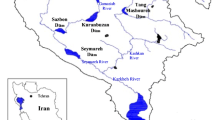Abstract
Due to the complexity of multi-reservoir system operation problems, researchers usually prefer to assume lumped demands located downstream of such systems. Consequently, distributed local demands through the system are neglected or supplied completely (e.g. using Standard operating policy, SOP), in order to simplify the problem. In this study, Coupled Operating Rules (COR) as a simple and suitable operating policy is applied for optimal operation of multi-reservoir systems with local demands. The applied policy includes two types of linear rules, which are defined to determine total releases and local water allocations in decision points. This policy is adopted within a simulation-optimization approach to optimally operate a three-reservoir system in the Karkheh river basin. Obtained results indicate that the proposed strategy reduces the intensity of demand deficits and distributes the occurred shortages throughout the system properly. Moreover, the system losses are managed appropriately and big unbalanced local shortages are prevented. Although COR strategy decreases the reliability of local demands compared to SOP, it is a reasonable operating policy for systems with distributed local demand sites. Moreover, in this study an effective Improved Melody Search (IMeS) algorithm is proposed to achieve the optimum values of operating rules’ parameters. The efficiency of the optimization method is compared to the results achieved by other selected well-known heuristic search methods. Based on the experimental results, it is revealed that the proposed algorithm is more effective in finding precise solutions over a long-term period, comparing with the other conventional algorithms.




Similar content being viewed by others
References
Afshar MH (2009) Elitist mutated particle swarm optimisation algorithms: application to reservoir operation problems. Water Management 162(WM6):409–417
Akbari-Alashti H, Bozorg-Haddad O, Fallah-Mehdipour E, Marino MA (2014) Multi-reservoir real-time operation rules: a new genetic programming approach. Water Management 167(WM10):561–576
Arena C, Cannarozzo M, Mazzola MR (2017) Exploring the potential and the boundaries of the rolling horizon technique for the Management of Reservoir Systems with over-year behaviour. Water Resour Manag 31:867–884
Ashrafi SM, Dariane AB (2011) A Novel and Effective Algorithm for Numerical Optimization: Melody Search. 11th international conference on Hybrid Intelligent Systems (HIS). Malacca, 5–8 December,109–114
Ashrafi SM, Dariane AB (2013) Performance evaluation of an improved harmony search algorithm for numerical optimization: Melody search (MS). Eng Appl Artif Intell 26(4):1301–1321
Ashrafi SM, and Kourabbaslou NE (2016) An Efficient Adaptive Strategy for Melody Search Algorithm. In Civil and Environmental Engineering: Concepts, Methodologies, Tools, and Applications (pp. 727–763). IGI Global
Bozorg HO, Janbaz M, Loáiciga HA (2016) Application of the gravity search algorithm to multi-reservoir operation optimization. Adv Water Resour 98:173–185
Chang LC, Chang FJ, Wang KW, Dai SY (2010) Constrained genetic algorithms for optimizing multi-use reservoir operation. J Hydrol 390:66–74
Chow VT, Cortes-Rivera G (1974) Application of DDDP in Water Resources Planning. University of Illinois at Urbana-Champaign, Water Resources Center
Dariane AB, Momtahen Sh (2009) Optimization of multireservoir systems operation using modified direct search genetic algorithm. J Water Resour Plan Manag 135:141–148
Gao W, Liu S, Huang L (2012) A global best artificial bee colony algorithm for global optimization. J Comput Appl Math 236:2741–2753
Guo X, Hu T, Zeng X, Li X (2013) Extension of parametric rule with the hedging rule for managing multi-reservoir system during droughts. J Water Resour Plan Manag 139(2):139–148
Hınçal N, Altan-Sakarya AB, Metin Ger A (2011) Optimization of Multireservoir systems by genetic algorithm. Water Resour Manag 25:1465–1487
Kang S, Lee S, Kang T (2017) Development and application of storage-zone decision method for long-term reservoir operation using the dynamically dimensioned search algorithm. Water Resour Manag 31:219–232
Kim T, Heo JH (2006) Application of multi-objective genetic algorithms to Multireservoir system optimization in the Han River basin. KSCE J Civ Eng 10(5):371–380
Koutsoyiannis D, Economou A (2003) Evaluation of the parameterization simulation-optimization approach for the control of reservoir systems. Water Resour Res 39(6):1170–1186
Kumar V, Chhabra JK, Kumar D (2014) Parameter adaptive harmony search algorithm for unimodal andmultimodal optimization problems. Journal of Computational Science 5:144–155
Lund JR, Guzman J (1999) Derived operating rules for reservoirs in series or in parallel. J Water Resour Plan Manag 125(3):143–153
Mahootchi M, Ponnambalam K, Tizhoosh HR (2010) Operations optimization of multireservoir systems using storage moments equations. Adv Water Resour 33:1150–1163
Mahdavi M, Fesanghary M, Damangir E (2007) An improved harmony search algorithm for solving optimization problems. Appl Math Comput 188:1567–1579
Ming B, Liu P, Bai T, Tang R, Feng M (2017) Improving optimization efficiency for reservoir operation using a search space reduction method. Water Resour Manag 31:1173–1190
Murray DM, Yakowitz SJ (1979) Constrained differential dynamic programming and its application to multi-reservoir control. Water Resour Res Wiley 15(5):1017–1027
Oliveira R, Loucks DP (1997) Operating rules for multireservoir systems. Water Resour Res 33:839–852
Pan QK, Suganthan PN, Tasgetiren MF, Liang JJ (2010) A self-adaptive global best harmony search algorithm. Appl Math Comput 216:830–848
Ponnambalam K, (2002) Optimization in water reservoir systems. In: Pardalos PM, Resende MGC, editors. Handbook of applied optimization. New York: Oxford University Press; Ch. 18.16.
Taghian M, Rosbjerg D, Haghighi A, Madsen H (2014) Optimization of conventional rule curves Coupled with hedging rules for reservoir operation. J Water Resour Plan Manag 140(5):693–698
Wang KW, Chang LC, Chang FJ (2011) Multi-tier interactive genetic algorithms for the optimization of long-term reservoir operation. Adv Water Resour 34:1343–1351
Zhang J, Zhen WU, Chun-tian C, Zhang S (2011) Improved particle swarm optimization algorithm for multi-reservoir system operation. Water Science and Engineering 4(1):61–73
Zhang R, Zhou J, Ouyang S, Wang X, Zhang H (2013) Optimal operation of multi-reservoir system by multi-elite guide particles warm optimization. Electrical Power and Energy Systems 48:58–68
Author information
Authors and Affiliations
Corresponding author
Rights and permissions
About this article
Cite this article
Ashrafi, S.M., Dariane, A.B. Coupled Operating Rules for Optimal Operation of Multi-Reservoir Systems. Water Resour Manage 31, 4505–4520 (2017). https://doi.org/10.1007/s11269-017-1762-y
Received:
Accepted:
Published:
Issue Date:
DOI: https://doi.org/10.1007/s11269-017-1762-y




